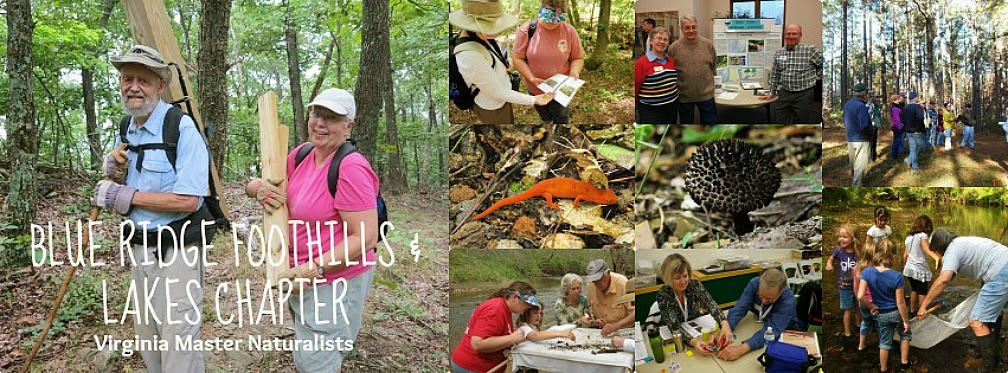In 2000, Virginia Naturally was designated as the official environmental education program of the Commonwealth.
Celebrate some accomplishments:
 Growing Partnerships:
Growing Partnerships:Virginia Naturally established a partnership program for businesses and organizations that have environmental components or missions as part of their programs. At the end of 2010 the Virginia Office of Environmental Education reported that there are over 900 Virginia Naturally Partners.
Virginia Naturally Schools:
As of 2010, 52 schools have been recognized as Virginia Naturally schools demonstrating exemplary practices in environmental education. Virginia Naturally schools make an effort to support environmental conservation and stewardship. A recognized school must continue to submit an annual plan and add an additional feature to its environmental and conservation plan each year.
As of 2010, 52 schools have been recognized as Virginia Naturally schools demonstrating exemplary practices in environmental education. Virginia Naturally schools make an effort to support environmental conservation and stewardship. A recognized school must continue to submit an annual plan and add an additional feature to its environmental and conservation plan each year.
Virginia Naturally Grants Program:
In 2002, in an effort to help teachers meet Bay Agreement's educational goals, the Virginia Resource Use Education Council (VRUEC) partnered with the National Oceanic and Atmospheric Administration (NOAA), the Virginia Environmental Endowment (VEE), and Smithfield Foods to establish and administer the Virginia Naturally Classroom program. Many classrooms around the state are conducting “Meaningful Watershed Educational Experiences" thanks to the Virginia Naturally Classroom Grants and Partner Grants. Combined, 748 grants have been awarded for a total of $643,900 involving more than 200,000 students, 1,000 faculty and 800 community partners.
In 2002, in an effort to help teachers meet Bay Agreement's educational goals, the Virginia Resource Use Education Council (VRUEC) partnered with the National Oceanic and Atmospheric Administration (NOAA), the Virginia Environmental Endowment (VEE), and Smithfield Foods to establish and administer the Virginia Naturally Classroom program. Many classrooms around the state are conducting “Meaningful Watershed Educational Experiences" thanks to the Virginia Naturally Classroom Grants and Partner Grants. Combined, 748 grants have been awarded for a total of $643,900 involving more than 200,000 students, 1,000 faculty and 800 community partners.
The Virginia Naturally website has a Calendar of Events page which lists environmentally themed events many of which are submitted by the partners. Partners also contribute to the newsletter and are the first to learn about upcoming activities before they are announced to the general public. Nearly 1,200 copies of Virginia’s Natural Resources Education Guide are downloaded each month from the website.
For additional information about the history of the VRUEC and Virginia Naturally, go to: www.vanaturally.com/vruec.html.
We welcome Virginia Department of Environmental Quality as one of the valuable sponsors of the Virginia Master Naturalist program! We look forward to sharing more about them in the coming months. Visit their website for more details here.
DEQ For Virginia Residents
The Department of Environmental Quality welcomes public involvement in environmental activities across the Commonwealth. Here are some ways for residents and communities to participate in environmental activities and remain aware of important issues.
Find More About..
- Current Air Quality Forcasts
- Read information about the current Virginia Drought Status
- Learn What's in my back Yard using the GIS Mapping program
- Read Fact Sheets about common information about environmental issues and VaDeq information
- Use the DEQ Environmental Glossary of terms
- Learn more about DEQ Programs
- Review the most recentenvironmental Reports and Data
- Subscribe to DEQ News Releases
Participate With DEQ
For Educators
Involvement Opportunities
BRFAL Chapter of Virginia Master Naturalist wants you to get outside, explore and see something new today. Don't forget your camera!Programs In Environmental Education
- DEQ environmental education web site
- Project WET: A water education program can teach everyone how water is needed and used. This program ensures an understanding of the importance of water conservation for today and in the future.
- Pollution Solutions: A full lesson plan of litter prevention activities for grade levels as high as 12th grade!
- Love a Tree: Excite your 3rd, 4th and 5th graders by teaching them about trees and their important roles in our environment.
Virginia's Environmental Education Network
- Virginia Naturally: A gateway to Virginia's environmental education resources.
Water Quality Monitoring
- Citizen Monitoring: Become a team volunteer and help monitor streams, rivers and lakes in your own community.
Data And Environmental Information
- Environmental data: DEQ provides a variety of reports, studies and databases of environmental information.
- Glossary
- Fact sheets
- Virginia's Natural Resource Education Guide
If you are interested in the Virginia Master Naturalist program and want to learn more about it, or when the next training will be held, click here. BRFAL Chapter will be holding the next basic training course beginning in March 2012 in downtown Rocky Mount at The Franklin Center. email: contact@brfal.org for more info!

No comments:
Post a Comment
Thanks for your comment and interest! NOW GO OUTSIDE!